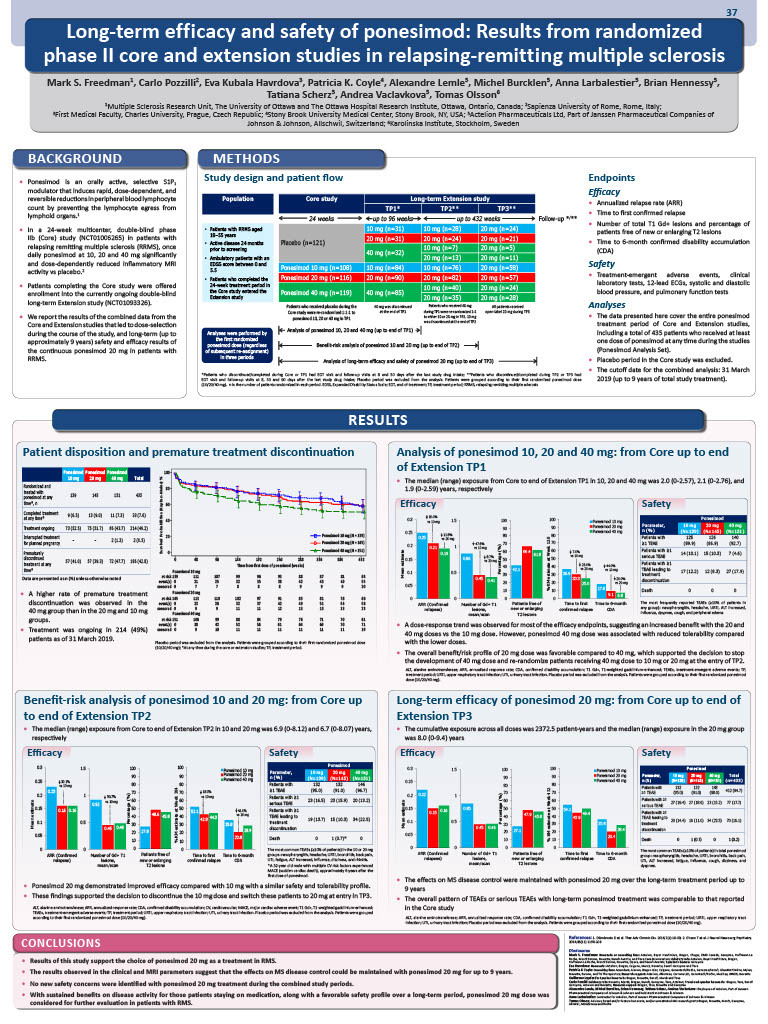Long-term efficacy and safety of ponesimod: Results from randomized phase II core and extension studies in relapsing remitting multiple sclerosis
Abstract
Background:
Ponesimod, an orally active, selective sphingosine 1-phosphate receptor-1 (S1P) modulator, showed benefits in clinical and MRI outcomes in a double-blind, placebo controlled, phase 2b Core Study (NCT01006265). Patients rolled-over into an ongoing Extension Study (NCT01093326).
Objective:
Evaluate the long-term efficacy and safety of ponesimod in patients with relapsing-remitting multiple sclerosis (RRMS).
Methods:
A total of 435 patients with RRMS received ≥1 dose of ponesimod (10, 20, or 40-mg/day) during the Core and/or Extension Study. The 40 and 10-mg doses were subsequently discontinued during Treatment Period 1 (TP1) and TP2 of the Extension Study. All patients received 10 or 20-mg during TP2, followed by open-label 20-mg in TP3. Key efficacy
parameters: annualized relapse rate (ARR), 6-month confirmed disability accumulation (CDA), and MRI outcomes. Safety parameters: frequencies of adverse events (AEs) and serious AEs (SAEs). Results of combined analyses of Core and Extension studies are presented.
Results:
As of 31 March 2019, 214 patients were still on ponesimod treatment; median exposure in 20-mg group was 8.02 years; Cumulative exposure across all doses was 2372.47 patients-years. In 20-mg group, ARR (95% CI) for confirmed relapses was 0.154 (0.111‒0.214); 64.1% patients remained free of confirmed relapse; Kaplan-Meier estimate of 6- month CDA at Week 432 was 20.4% (13.7‒29.7); Mean number of T1 gadolinium enhancing lesions per patient per scan was 0.448 (0.305‒0.657); Mean number of new or enlarging T2 lesions per year was 0.718 (0.523‒0.985). In ponesimod-treated patients, the most common treatment-emergent AEs were nasopharyngitis (30%), headache (24%) and upper respiratory tract infection (21%). Most SAEs were reported in a single patient, no SAE was reported at an incidence of >1%.
Conclusions:
Long-term treatment with ponesimod 20 mg showed consistently low levels of disease activity across relevant clinical and MRI outcomes in patients with RRMS. No new safety signals were identified.
Long-term efficacy and safety of ponesimod: Results from randomized phase II core and extension studies in relapsing-remitting multiple sclerosis
Mark S. Freedman1*, Carlo Pozzilli2, Eva Kubala Havrdova3, Patricia K. Coyle4, Alexandre Lemle5, Michel Burcklen5, Anna Larbalestier5, Brian Hennessy5, Tatiana Scherz5, Andrea Vaclavkova5, Tomas Olsson6
1Multiple Sclerosis Research Unit, The University of Ottawa and The Ottawa Hospital Research Institute, Ottawa, Ontario, Canada; 2Sapienza University of Rome, Rome, Italy; 3First Medical Faculty, Charles University, Prague, Czech Republic; 4Stony Brook University Medical Center, Stony Brook, NY, USA; 5Actelion Pharmaceuticals Ltd, Part of Janssen Pharmaceutical Companies, Allschwil, Switzerland; 6Karolinska Institute, Stockholm, Sweden.
*Presenting author
Encore abstract: Poster previously presented at the 8th Joint ACTRMS-ECTRIMS Meeting, September 9-12, 2020

